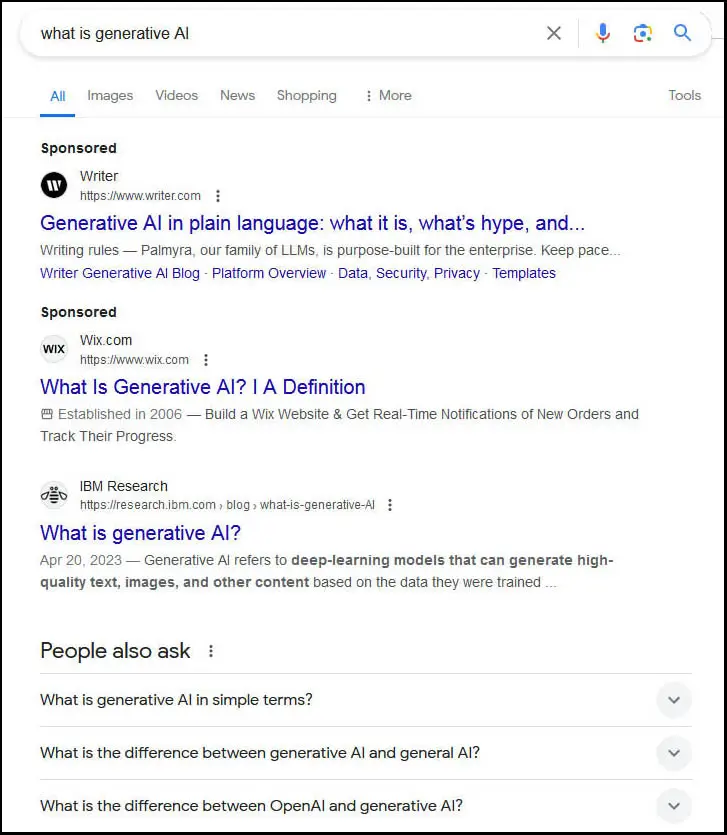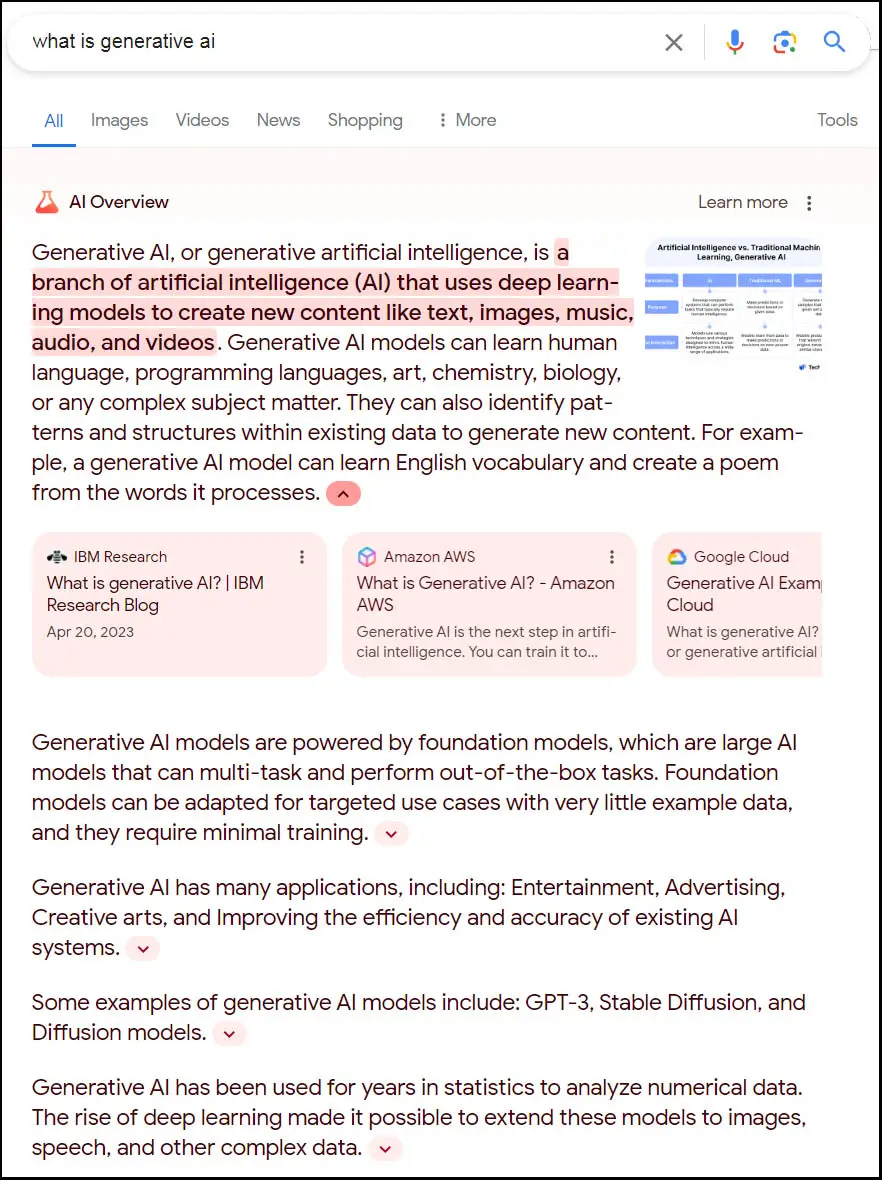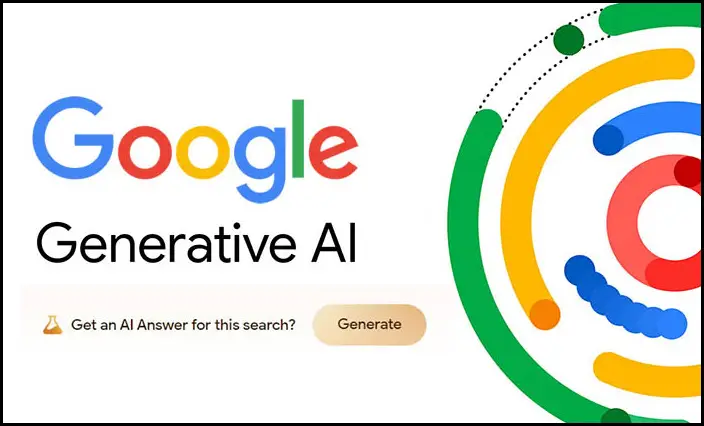Pretty soon Google searches are going to go from looking like this…

To looking like this…

These new types of searches use “generative AI,” so when you ask Google a question, you can get all the information that you need right at the top of the page. Searchers will no longer need to click through to a website to find the information they want. If you are familiar with ChatGPT, it’s an example of generative AI, but Google will be applying this technology specifically to its search engine.
Google is calling this new feature “AI Overviews”, and it’s about to become commonplace soon. Initially launched in the US in 2023, it’s currently available to users who sign up. I have done this and am really liking the results. To experiment with Google’s new AI search engine, visit labs.google.com/search. Google plans to first release it to one million users in the United States and gradually increase to 30 million users by the end of 2024.
How Does Generative AI Work?
At the heart of Googles’s new AI Overview feature lies a sophisticated network of computer learning algorithms trained on massive datasets encompassing a wide range of topics and domains. These algorithms are capable of analyzing and interpreting the way people talk, understanding the context of a question, and generating relevant and coherent responses in real time.
When you type a question, a topic, or a request, Google’s generative AI reads and understands what you’re asking. It thinks about all the information it has learned and creates a new unique answer. Then, it sends you a response that tries to be helpful and relevant to your question. This content may include text-based explanations, multimedia resources, interactive experiences, and more.
One of the key strengths of generative AI is its ability to generate diverse and relevant content across a wide range of topics. Whether you’re exploring scientific concepts, delving into historical events, or seeking practical advice, generative AI can provide tailored responses.
The Potential of Generative AI
The introduction of generative AI marks a significant milestone in the evolution of search technology and has the potential to transform our digital lives. Here are some ways in which generative AI could revolutionize the way we search, learn, and interact with information:
Enhanced Search Experience: With generative AI, users can expect a more intuitive and personalized search experience. Instead of sifting through endless search results, Google’s AI Overviews can deliver concise and relevant content that directly addresses the user’s query, saving time and effort.
Expanded Discoveries: Generative AI opens up new avenues for knowledge discovery by generating fresh insights and explanations on-demand. Users can explore complex topics in depth, gain a deeper understanding of unfamiliar concepts, and discover connections between concepts.
Empowering Creativity: Generative AI serves as a valuable tool for creativity and coming up with new ideas, providing inspiration and resources for creative projects across various disciplines. Whether you’re writing a story, designing a project, or brainstorming ideas, generative AI can spark creativity and fuel innovation.
Accessible Learning Resources: Generative AI democratizes access to learning resources by providing accessible and inclusive content tailored to diverse learning styles and preferences. Whether you’re a visual learner, an auditory learner, or a hands-on learner, Google’s AI Overviews will offer a range of multimedia resources to support your learning journey.
The Downside of Generative AI
The challenge with generative artificial intelligence is that it is scouring all of this “free” content, learning from it, combining it with other content, and delivering an answer to a user without ever citing its source. It’s delivering no value back to the original creator. The first impact of this will be a big increase in the number of “no click” searches, where users get their answers without having to take any other action. On the face of it, this is great for users but not so good for businesses.
Generative AI could lead to a decrease in web traffic to individual sites. If people can get the answers they need from generative AI models, they may be less likely to visit websites. This could lead to a decrease in ad revenue and other forms of income for websites and the possibility of not ranking in search results. Businesses can likely anticipate a drop in organic traffic. Marketers will need to strategize and produce different content. This may entail a move towards other forms of media, such as podcasts or YouTube videos. Google did hint that their sponsored ads will still sit above the AI-generated response.
How it Might All Pan Out
Generative AI represents a quantum leap forward in the field of search technology, offering unprecedented capabilities for information retrieval, generation, and interaction. With its ability to understand how humans speak and write, generate relevant content, and adapt to user preferences, it has the potential to revolutionize the way we search, learn, and interact with information online. As Google continues to refine and expand the capabilities of it’s generative AI platform, we can expect to see exciting developments that further enhance the search experience and empower users to explore, learn, and create in new and innovative ways.


